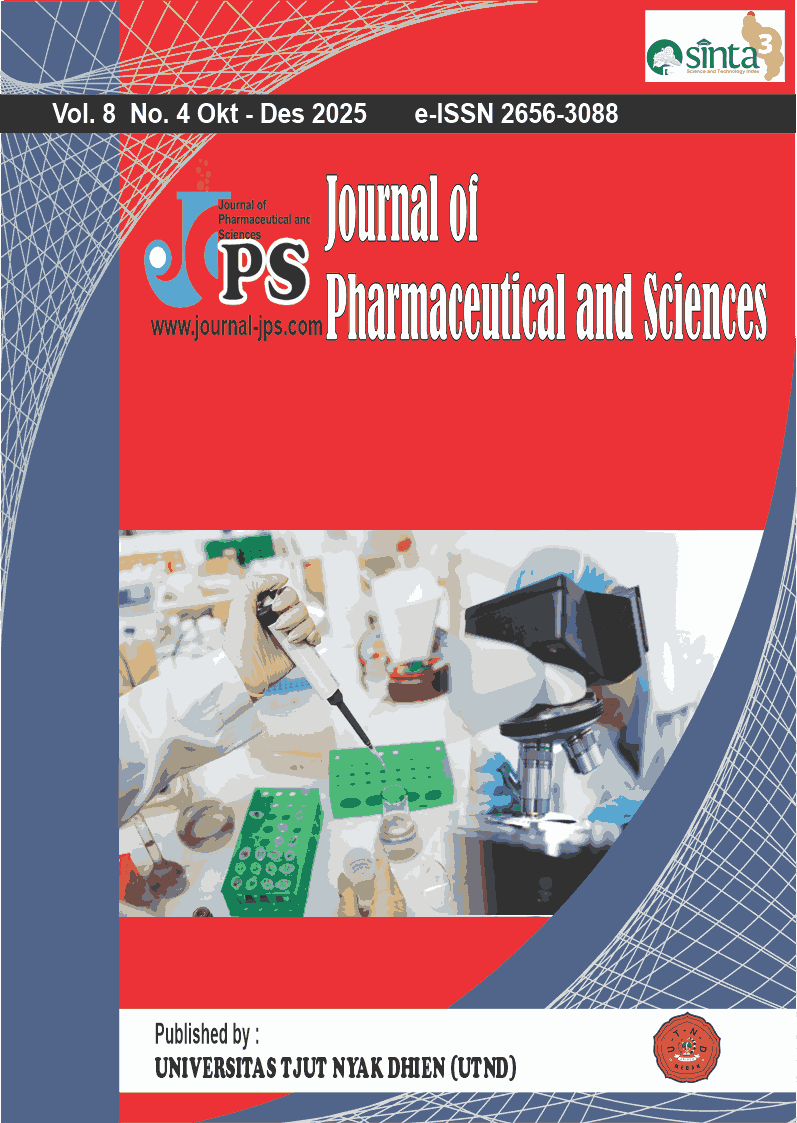Relationship of Education, Knowledge and Parity with the Ability to Care for Newborns
Main Article Content
Page: 2242-2252
Abstract
Background: Neonates are children aged 0 to 28 days. Efforts to establish a healthy lifestyle should begin during the neonatal period, as this is a stage of rapid growth and development. The mother's role is crucial as the primary caregiver, supporting the baby's physical, social, and emotional development. To address various challenges in infants, mothers are required to possess good knowledge and skills in caring for their babies. Objective: To determine the correlation between knowledge, education, and parity on the ability to care for newborns at the Sunggal Primary Clinic. Methods: This study was a quantitative analytical study with a cross-sectional approach. Data were collected through questionnaires and direct interviews with 60 respondents. Data analysis employed univariate and bivariate analysis using the chi-square test, supplemented with the association measure Prevalence Ratio (PR) and 95% Confidence Interval (CI). Results: The bivariate analysis results showed that education (p = 0.000; PR = 3.58; 95% CI: 1.45-8.83), knowledge (p = 0.000), and parity (p = 0.000; PR = 2.79; 95% CI: 1.83-4.24) were significantly associated with the ability to care for newborns. The PR values indicate that mothers with higher education were 3.58 times more likely to be capable of caring for their babies, and mothers with higher parity were 2.79 times more likely. Conclusion: The variables of education, knowledge, and parity have a significant and meaningful relationship with maternal competence in caring for neonates. Education and parity demonstrate a strong influence on the ability to care for newborns.
Downloads
Article Details

This work is licensed under a Creative Commons Attribution-NonCommercial-ShareAlike 4.0 International License.
References
Wahyuni S, Dhiana Setyorini D, Arisani G, Nuraina N, Sukriani W, Meyasa L, et al. Buku ajar asuhan kebidanan persalinan dan bayi baru lahir 2023.
Febrianti R. Asuhan Kebidanan Pada Bayi Barua Lahir Dengan Perawatan Tali Pusat Terbuka. J Komun Kesehat 2020;11.
Suryaningsih Ss, Keb M, Wulan R, Yulianti NT, SiT S, Keb M, et al. Buku Ajar Bayi Baru Lahir DIII Kebidanan Jilid I. Mahakarya Citra Utama Group; 2022.
Husna F, Ariningtyas N, Amelia V. Faktor yang memepengaruhi pengetahuan ibu nifas tentang perawatan bayi baru lahir di klinik pratama kedaton. J Ilmu Kesehat Mulia Madani Yogyakarta 2024;5:1–8.
Kemenkes, RI. Health Statistics (Health Information System). 2020. https://doi.org/10.5005/jp/books/11257_5. DOI: https://doi.org/10.5005/jp/books/11257_5
Statistik BP. Mortalitas Di Indonesia. Mortal Di Indones Has Long Form Sensus Pendud 2020:1–98.
Husada D, Chanthavanich P, Chotigeat U, Sunttarattiwong P, Sirivichayakul C, Pengsaa K, et al. Predictive model for bacterial late-onset neonatal sepsis in a tertiary care hospital in Thailand. BMC Infect Dis 2020;20:151. DOI: https://doi.org/10.1186/s12879-020-4875-5
LA ALIFARIKI ODE. Analisis Risiko Kejadian Stunting Ditinjau Dari Aspek Antenatal Care Dan Postnatal Care. J Keperawatan Suaka Insa 2022.
Rintiani A, Dewi YI, Utami S. Faktor-Faktor Yang Berhubungan Dengan Kemampuan Ibu Primipara Dalam Merawat Bayi Baru Lahir. BIMIKI (Berkala Ilm Mhs Ilmu Keperawatan Indones 2022;10:85–92. DOI: https://doi.org/10.53345/bimiki.v10i2.313
Yuliyanti T, Yugistyowati A, Khodriyati NS. Dukungan petugas kesehatan dan kemampuan ibu merawat bayi baru lahir. Indones J Hosp Adm 2020;3:17–26. DOI: https://doi.org/10.21927/ijhaa.2020.3(1).17-26
Hidayah YN, Azza A, Yulis ZE. Hubungan Pengetahuan Tentang Perawatan Bayi Baru Lahir Dengan Penerimaan Peran Baru Pada Ibu Primipara di Desa Tugusari Kabupaten Jember. Univ Muhammadiyah Jember 2021.
Rahman A, Long BS. Causes of neonatal deaths in Malaysian neonatal intensive care units in 2015-2020: a descriptive study. Malays J Pathol 2025;47:233–45.
Maryuni M. Hubungan karakteristik ibu bersalin dengan nyeri persalinan. J Heal Sci Physiother 2020;2:116–22. DOI: https://doi.org/10.35893/jhsp.v2i1.42
Nurjanah SN, Maemunah AS, Badriah DL. Asuhan Kebidanan Post Partum Dilengkapi dengan Asuhan Kebidanan Post Sectio Caesarea. Bandung PT Refrika Aditama 2013.
Zulianti E, Aniroh U. Korelasi paritas dengan kemampuan ibu post partum dalam merawat bayi baru lahir. J Keperawatan Dan Kesehat Masy Cendekia Utama 2021;10:92–100. DOI: https://doi.org/10.31596/jcu.v10i1.706
Wulandari R, Sumanti NT. Analisis faktor peran bidan, sarana prasarana dan pengetahuan ibu dalam pelaksanaan ANC terintegrasi di Praktek Bidan Mandiri (PBM) W di Bojong Gede tahun 2020. J Kebidanan Dan Keperawatan Aisyiyah 2022;18:1–9. https://doi.org/10.31101/jkk.1748. DOI: https://doi.org/10.31101/jkk.1748
Sugiyono. Metodologi Penelitian Kuantitatif Kualitatif dan R&D. Bandung: Alfabeta; 2019.
Sugiyono. Metode penelitian manajemen. Bandung Alf CV 2016.
Minda B, Bekele G, Hailemeskel S, Lambebo A. Determinants of low birth weight among newborns delivered in public hospitals of North Shewa Zone, Amhara region, Ethiopia: A case-control study (2023). PLoS One 2024;19:e0303364. DOI: https://doi.org/10.1371/journal.pone.0303364
Muhafilah L. Pengaruh Pendidikan Kesehatan Tentang Perawatan Bayi Baru Lahir Terhadap Pengetahuan Ibu Dalam Mencegah Hiperbilirubinemia Neonatus: Literature Review 2020.
Gözen D, Çaka SY, Beşirik SA, Perk Y. First bathing time of newborn infants after birth: A comparative analysis. J Spec Pediatr Nurs 2019;24:e12239. DOI: https://doi.org/10.1111/jspn.12239
Erawati AD, Puspitasari D, Cahyaningsih O. Pengetahuan ibu nifas tentang perawatan tali pusat di wilayah puskesmas ambarawa kabupaten semarang. J Ilmu Kesehat Masy 2020;9:43–7. DOI: https://doi.org/10.33221/jikm.v9i01.476
Lestari Y, Adila DR, Lestari RF. Hubungan Tingkat Pengetahuan dan Sikap Ibu terhadap Tindakan Mencuci Tangan dalam Perawatan Tali Pusat Bayi Baru Lahir. J Med Hutama 2021;2. DOI: https://doi.org/10.35328/keperawatan.v9i2.1031
Timah S. Pengaruh pendidikan Kesehatan perawatan tali pusat bayi baru lahir terhadap tingkat pengetahuan. J Ilm Kesehat Pencerah 2020;9:155–63.
Rini S, Dewi FK. The Impact of Holistic Midwifery Care in Postpartum Anemia to Baby Growth (A Case Study in Ledug, Banyumas, Indonesia 2019). 1st Int. Conf. Community Heal. (ICCH 2019), Atlantis Press; 2020, p. 106–9. DOI: https://doi.org/10.2991/ahsr.k.200204.025
Lindayani IK, Purnamayanti NMD. Pengaruh edukasi menyusui terhadap pengetahuan dan self efficacy primigravida. SIKLUS J Res Midwifery Politek Tegal 2023;12. DOI: https://doi.org/10.30591/siklus.v12i1.4459
PUTRANTO RA, Suryono S, Suseno JE. Cloud Computing Rekam Medis Status Gizi Bayi Terkait Indeks Antropometri Pada Masa Postpartum 2018.
Sari YM. Determinan kejadian bayi berat lahir rendah (BBLR) di RS Kencana Serang Banten tahun 2019. J Bid Ilmu Kesehat 2021;11:46–62. DOI: https://doi.org/10.52643/jbik.v11i1.1346
Priansiska N, HadiNingsih FSW. Hubungan Usia dan Paritas Ibu Hamil Trimester III dengan Tingkat Pengetahuan Perawatan Bayi Baru Lahir. Heal CARE J Kesehat 2023;12:437–44. DOI: https://doi.org/10.36763/healthcare.v12i2.383
Sulami N, Aliayati NN. Gambaran Pengetahuan Ibu Tentang Bahaya Penggunaan Bedak Pada Bayi Usia 0-12 Bulan Di Desa Sumi Wilayah Kerja Puskesmas Lambu. J Kebidanan Dan Kesehat 2024;2:53–8. DOI: https://doi.org/10.70683/jkk.v2i2.29





